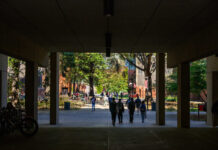
As a youngster, UofL junior Conrad Smart spent a lot of time helping his father, Eric Smart, build and fix things.
That early training helped the youngster cultivate an aptitude for problem solving and physics – a foundation that recently helped him win a prestigious Goldwater scholarship, one of just 252 such awards given this year in the U.S.
The scholarship goes to undergraduate students in the fields of mathematics, science or engineering and provides up to $7,500 for tuition, fees, books, room and board.
Smart believes that his father’s influence helped lay the groundwork for his interest in science and ability to vie for the prominent scholarship.
“While working, he would discuss the functions of objects: why we use screws instead of nails; why plywood is so heavy compared to balsa wood; why we need to use a wrench, etc. He would spend the time to explain to me the how and why,” said Smart. “These questions developed me as a scientist and I still ask these questions as a physicist investigating the structure of matter.”
A physics and mathematics major, Smart will use his Goldwater scholarship to work toward his ultimate goal of earning a doctoral degree in theoretical particle physics.
“This intertwining of mathematics and physics in an effort to define the smallest details of the universe is the discovery of profound beauty and insightful explanation,” he explained.
Smart grew up in Woodford County, Kentucky, and is a 2013 graduate of Woodford County High School. His parents are Eric and Laurie Smart of Versailles.
He came to UofL as a Brown Fellow, perhaps the most prestigious scholarship program offered at the university. He is also a member of the University Honors Program and a Grawemeyer Research Scholar.
He already has contributed to several UofL projects and has presented findings at meetings including the Atlantic Coast Conference “Meeting of the Minds” research conference. He also received Research Experience for Undergraduates grants from the National Science Foundation to work with Cornell University’s accelerator physics program last summer and to work on plasma physics at University of California-Los Angeles this summer.
Smart praised the mentoring relationship between faculty and undergraduate students, who can learn early in their university careers the precise ways to do meaningful scientific research and work in groups.
“There’s a lot of opportunity there,” he said. “It’s good to start early. The relationships with faculty are what propel me forward.”
Physics Professor David Brown, who facilitated one of Smart’s research groups in 2014-15, said Smart has a “voracious appetite” for knowledge and understanding.
“He shows an incredible mind for grasping new concepts and synthesizing information into new ideas,” Brown said. “It’s obvious he has an unstoppable curiosity about the way the universe works at its most fundamental level and that he thinks deeply about these issues and actively pursues answers.”































